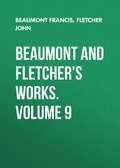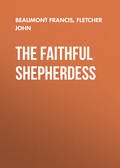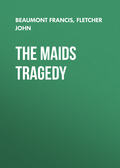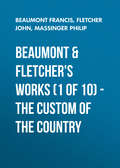полная версия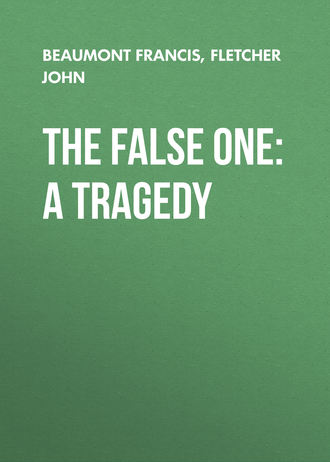

Beaumont Francis
The False One: A Tragedy
SCENA II
Enter Antony, Dolabella, Sceva
Dol. Nay there's no rowsing him: he is bewitch'd sure,
His noble blood curdled, and cold within him;
Grown now a womans warriour.
Sce. And a tall one:
Studies her fortifications, and her breaches,
And how he may advance his ram to batter
The Bullwork of her chastitie.
Ant. Be not too angry,
For by this light, the woman's a rare woman,
A Lady of that catching youth, and beauty,
That unmatch'd sweetness—
Dol. But why should he be fool'd so?
Let her be what she will, why should his wisdom,
His age, and honour—
Ant. Say it were your own case,
Or mine, or any mans, that has heat in him:
'Tis true at this time when he has no promise
Of more security than his sword can cut through,
I do not hold it so discreet: but a good face, Gentlemen,
And eyes that are the winningst Orators:
A youth that opens like perpetual spring,
And to all these, a tongue that can deliver
The Oracles of Love—
Sce. I would you had her,
With all her Oracles, and Miracles,
She were fitter for your turn.
Ant. Would I had, Sceva,
With all her faults too: let me alone to mend 'em,
O'that condition I made thee mine heir.
Sce. I had rather have your black horse, than your harlots.
Dol. Cæsar writes Sonnetts now, the sound of war
Is grown too boystrous for his mouth: he sighs too.
Sce. And learns to fiddle most melodiously,
And sings, 'twould make your ears prick up, to hear him Gent.
Shortly she'l make him spin: and 'tis thought
He will prove an admirable maker of Bonelace,
And what a rare gift will that be in a General!
Ant. I would he could abstain.
Sce. She is a witch sure,
And works upon him with some damn'd inchantment.
Dol. How cunning she will carry her behaviours,
And set her countenance in a thousand postures,
To catch her ends!
Sce. She will be sick, well, sullen,
Merry, coy, over-joy'd, and seem to dye
All in one half hour, to make an asse of him:
I make no doubt she will be drunk too damnably,
And in her drink will fight, then she fits him.
Ant. That thou shouldst bring her in!
Sce. 'Twas my blind fortune,
My Souldiers told me, by the weight 'twas wicked:
Would I had carried Milo's Bull a furlong,
When I brought in this Cow-Calf: he has advanced me
From an old Souldier, to a bawd of memory:
O, that the Sons of Pompey were behind him,
The honour'd Cato, and fierce Juba with 'em,
That they might whip him from his whore, and rowze him:
That their fierce Trumpets, from his wanton trances,
Might shake him like an Earth-quake.
Enter Septimius
Ant. What's this fellow?
Dol. Why, a brave fellow, if we judge men by their clothes.
Ant. By my faith he is brave indeed: he's no commander?
Sce. Yes, he has a Roman face, he has been at fair wars
And plenteous too, and rich, his Trappings shew it.
Sep. And they will not know me now, they'l never know me.
Who dare blush now at my acquaintance? ha?
Am I not totally a span-new Gallant,
Fit for the choycest eyes? have I not gold?
The friendship of the world? if they shun me now
(Though I were the arrantest rogue, as I am well forward)
Mine own curse, and the Devils too light on me.
Ant. Is't not Septimius?
Sce. Yes.
Dol. He that kill'd Pompey?
Sce. The same Dog, Scab; that guilded botch, that rascal.
Dol. How glorious villany appears in Egypt!
Sep. Gallants, and Souldiers, sure they do admire me.
Sce. Stand further off, thou stinkest.
Sep. A likely matter:
These Cloaths smell mustily, do they not, Gallants?
They stink, they stink, alas poor things, contemptible.
By all the Gods in Egypt, the perfumes
That went to trimming these cloathes, cost me—
Sce. Thou stinkest still.
Sep. The powdering of this head too—
Sce. If thou hast it,
I'le tell thee all the Gumms in sweet Arabia
Are not sufficient, were they burnt about thee,
To purge the scent of a rank Rascal from thee.
Ant. I smell him now: fie, how the Knave perfumes him,
How strong he scents of Traitor!
Dol. You had an ill Millener,
He laid too much of the Gum of Ingratitude
Upon your Coat, you should have washt off that Sir,
Fie, how it choaks! too little of your loyaltie,
Your honesty, your faith, that are pure Ambers;
I smell the rotten smell of a hired Coward,
A dead Dog is sweeter.
Sep. Ye are merry Gentlemen,
And by my troth, such harmless mirth takes me too,
You speak like good blunt Souldiers; and 'tis well enough:
But did you live at Court, as I do, Gallants,
You would refine, and learn an apter language;
I have done ye simple service on your Pompey,
You might have lookt him yet this brace of twelve months
And hunted after him, like foundred Beagles,
Had not this fortunate hand—
Ant. He brags on't too:
By the good Gods, rejoyces in't; thou wretch
Thou most contemptible Slave.
Sce. Dog, mangy Mongrel,
Thou murdring mischief, in the shape of Souldier
To make all Souldiers hatefull; thou disease
That nothing but the Gallows can give ease to.—
Dol. Thou art so impudent, that I admire thee,
And know not what to say.
Sep. I know your anger
And why you prate thus: I have found your melancholy:
Ye all want mony, and you are liberal Captains,
And in this want will talk a little desperately:
Here's gold, come share; I love a brave Commander:
And be not peevish, do as Cæsar does:
He's merry with his wench now, be you jovial,
And let's all laugh and drink: would he have partners?
I do consider all your wants, and weigh 'em,
He has the Mistris, you shall have the maids,
I'le bring 'em to ye, to your arms.
Ant. I blush,
All over me, I blush, and sweat to hear him:
Upon my conscience, if my arms were on now
Through them I should blush too: pray ye let's be walking.
Sce. Yes, yes: but e're we goe, I'le leave this lesson,
And let him study it: first Rogue, then Pander,
Next Devil that will be; get thee from mens presence,
And where the name of Souldier has been heard of
Be sure thou live not: to some hungry desert
Where thou canst meet with nothing but thy conscience,
And that in all the shapes of all thy vill[anie]s
Attend thee still, where bruit Beasts will abhor thee,
And even the Sun will shame to give thee light,
Goe hide thy head: or if thou think'st it fitter
Goe hang thy self.
Dol. Hark to that clause.
Sce. And that speedily,
That nature may be eas'd of such a Monster. [Exit.
Sep. Yet all this moves not me: nor reflects on me:
I keep my gold still, and my confidence,
Their want of breeding makes these fellows murmur,
Rude valors, so I let 'em pass; rude honours:
There is a wench yet, that I know, affects me
And company for a King: a young plump villain,
That when she sees this gold, she'l leap upon me.
Enter Eros
And here she comes: I am sure of her at midnight,
My pretty Eros welcom.
Eros. I have business.
Sep. Above my love, thou canst not.
Eros. Yes indeed Sir,
Far, far above.
Sep. Why, why so coy? 'pray ye tell me
We are alone.
Eros. I am much asham'd we are so.
Sep. You want a new Gown now, & a handsom Petticoat,
A Skarf, and some odd toyes: I have gold here ready,
Thou shal[t] have any thing.
Eros. I want your absence:
Keep on your way, I care not for your company.
Sep. How? how? you are very short: do you know me Eros?
And what I have been to ye?
Eros. Yes I know ye:
And I hope I shall forget ye: Whilst you were honest
I lov'd ye too.
Sep. Honest? come prethee kiss me.
Eros. I kiss no knaves, no Murderers, no Beasts,
No base betrayers of those men that fed 'em,
I hate their looks; and though I may be wanton,
I scorn to nourish it with bloody purchase,
Purchase so foully got; I pray ye unhand me
I had rather touch the plague, than one unworthy:
Goe seek some Mistris that a horse may marry,
And keep her company, she is too good for ye. [Exit.
Sep. Marry this goes near; now I perceive I am hatefull,
When this light stuff can distinguish, it grows dangerous,
For mony, seldom they refuse a Leper:
But sure I am more odious, more diseas'd too:
Enter three lame Souldiers
It sits cold here; what are these? three poor Souldiers?
Both poor and lame: their misery may make 'em
A little look upon me, and adore me,
If these will keep me company, I am made yet.
1 Sol. The pleasure Cæsar sleeps in, makes us miserable,
We are forgot, our maims and dangers laugh'd at;
He Banquets, and we beg.
2 Sol. He was not wont
To let poor Souldiers that have spent their Fortunes,
Their Bloods, and limbs, walk up and down like vagabonds.
Sep. Save ye good Souldiers: good poor men, heaven help ye:
You have born the brunt of war, and shew the story,
1 Sol. Some new commander sure.
Sep. You look (my good friends)
By your thin faces, as you would be Suitors.
2 Sol. To Cæsar, for our means, Sir.
Sep. And 'tis fit Sir.
3 Sol. We are poor men, and long forgot.
Sep. I grieve for it:
Good Souldiers should have good rewards, and favours,
I'le give up your petitions, for I pity ye,
And freely speak to Cæsar.
All. O we honour ye.
1 Sol. A good man sure ye are: the Gods preserve ye.
Sep. And to relieve your wants the while, hold Soldiers,
Nay 'tis no dream: 'tis good gold: take it freely,
'Twill keep ye in good heart.
2 Sol. Now goodness quit ye.
Sep. I'le be a friend to your afflictions,
And eat, and drink with ye too, and we'l be merry:
And every day I'le see ye.
1 Sol. You are a Souldier,
And one sent from the Gods, I think.
Sep. I'le cloth ye,
Ye are lame, and then provide good lodging for ye:
And at my Table, where no want shall meet ye.
Enter Sceva
All. Was never such a man.
1 Sold. Dear honour'd Sir,
Let us but know your name, that we may worship ye.
2 Sold. That we may ever thank.
Sep. Why, call me any thing,
No matter for my name, that may betray me.
Sce. A cunning thief, call him Septimius, Souldiers,
The villain that kill'd Pompey.
All. How?
Sce. Call him the shame of men. [Exit.
1 Sold. O that this mony
Were weight enough to break thy brains out: fling all:
And fling our curses next: let them be mortal,
Out bloody wolf, dost thou come guilded over,
And painted with thy charitie, to poyson us?
2 Sold. I know him now: may never Father own thee,
But as a monstrous birth shun thy base memory:
And if thou hadst a Mother (as I cannot
Believe thou wert a natural Burden) let her womb
Be curs'd of women for a bed of vipers.
3 Sol. Me thinks the ground shakes to devour this rascal,
And the kind air turns into foggs and vapours,
Infectious mists, to crown his villanies.
Thou maist go wander, like a thing heaven hated.
1 Sold. And valiant minds hold poysonous to remember.
The Hangman will not keep thee company,
He has an honourable house to thine,
No, not a thief though thou couldst save his life for't
Will eat thy bread, nor one, for thirst starv'd, drink with thee.
2 Sol. Thou art no company for an honest dog,
And so we'l leave thee to a ditch (thy destiny.) [Exeunt.
Sep. Contemn'd of all? and kickt too? now I find it;
My valour's fled too, with mine honesty,
For since I would be knave I must be Coward:
This 'tis to be a Traitor, and betrayer.
What a deformity dwells round about me!
How monstrous shews that man, that is ungratefull!
I am afraid the very beasts will tear me,
Inspir'd with what I have done: the winds will blast me:
Now I am paid, and my reward dwells in me,
The wages of my fact, my soul's opprest;
Honest and noble minds, you find most rest. [Exit.
SCENA III
Enter Ptolomy, Achoreus, Photinus, Achillas
Ptol. I have commanded, and it shall be so,
A preparation I have set o' foot,
Worthy the friendship and the fame of Cæsar,
My Sisters favours shall seem poor and wither'd:
Nay she her self, (trim'd up in all her beautys)
Compar'd to what I'le take his eyes withall,
Shall be a dream.
Pho. Do you mean to shew the glory,
And wealth of Egypt?
Ptol. Yes: and in that lustre,
Rome shall appear in all her famous Conquests,
And all her riches of no note unto it.
Ach. Now you are reconcil'd to your fair Sister,
Take heed Sir, how you step into a danger:
A danger of this precipice: but note Sir,
For what Rome ever rais'd her mighty armies;
First for ambition, then for wealth: 'tis madness,
Nay more, a secure impotence, to tempt
An armed Guest: feed not an eye, that conquers,
Nor teach a fortunate sword the way to be covetous.
Ptol. Ye judge amiss, and far too wide to alter me,
Yet all be ready, as I gave direction:
The secret way of all our wealth appearing
Newly, and handsomely: and all about it:
No more disswading: 'tis my will.
Ach. I grieve for't.
Ptol. I will dazel Cæsar, with excess of glory.
Pho. I fear you'l curse your will, we must obey ye. [Exit.
SCENA IV
Enter Cæsar, Antony, Dolabella, Sceva, above
Cæsar. I wonder at the glory of this Kingdom,
And the most bounteous preparation,
Still as I pass, they court me with.
Sceva. I'le tell ye:
In Gaul, and Germany, we saw such visions,
And stood not to admire 'em, but possess 'em:
When they are ours, they are worth our admiration.
Enter Cleopatra
Ant. The young Queen comes: give room.
Cæsar. Welcom (my dearest)
Come bless my side.
Sceva. I marry: here's a wonder,
As she appears now, I am no true Souldier,
If I be not readie to recant.
Cleo. Be merry Sir,
My Brother will be proud to do you honour
That now appears himself.
Enter Ptolomy, Achoreus, Achillas, Photinus, Apollodorus
Pto. Haile to great Cæsar
My Royal Guest, first I will feast thine eyes
With wealthy Ægypts store, and then thy palate,
And wait my self upon thee. [Treasure brought in.
Cæsar. What rich Service!
What mines of treasure!
Cleo. My Cæsar,
What do you admire? pray ye turn, and let me talk to ye.
Have ye forgot me Sir? how, a new object?
Am I grown old o'th' sudden, Cæsar?
Cæsar. Tell me
From whence comes all this wealth?
Cleo. Is your eye that way?
And all my Beauties banisht?
Ptol. I'le tell thee Cæsar,
We owe for all this wealth to the old Nilus:
We need no dropping rain to cheer the husband-man,
Nor Merchant that ploughs up the Sea, to seek us;
Within the wealthy womb of reverent Nilus,
All this is nourish'd: who to do thee honour,
Comes to discover his seven Deities,
(His conceal'd heads) unto thee: see with pleasure.
Cæsar. The matchless wealth of this Land!
Cleo. Come, ye shall hear me.
Cæsar. Away: let me imagine.
Cleo. How? frown on me?
The eyes of Cæsar wrapt in storms?
Cæsar. I am sorry:
But let me think—
Mustek, SONG
Enter Isis, and three Labourers
Isis, the Goddess of this Land,
Bids thee (great Cæsar) understand
And mark our Customes, and first know,
With greedy eyes these watch the flow
Of plenteous Nilus: when he comes,
With Songs, with Daunces, Timbrels, Drums
They entertain him, cut his way,
And give his proud Heads leave to play:
Nilus himself shall rise, and show
His matchless wealth in Over-flow.
Labourers SONG
Come let us help the reverend Nile,
He's very old (alas the while)
Let us dig him easie wayes,
And prepare a thousand Playes:
To delight his streams let's sing
A loud welcom to our Spring.
This way let his curling Heads
Fall into our new made Beds.
This way let his wanton spawns,
Frisky and glide it o're the Lawns.
This way profit comes, and gain:
How he tumbles here amain!
How his waters haste to fall
Into our Channels! Labour all
And let him in: Let Nilus flow,
And perpetuall plenty show.
With Incense let us bless the brim,
And as the wanton fishes swim,
Let us Gums, and Garlands fling,
And loud our Timbrels ring.
Come (old Father) come away,
Our labour is our holy day.
Isis. Here comes the aged River now
With Garlands of great Pearl, his Brow
Begirt and rounded: In his Flow
All things take life; and all things grow.
A thousand wealthy Treasures still,
To do him service at his will
Follow his rising Flood, and pour
Perpetuall blessings in our store.
Hear him: and next there will advance,
His sacred Heads to tread a Dance,
In honour of my Royal Guest,
Mark them too: and you have a Feast.
Cleo. A little dross betray me?
Cæsar. I am asham'd I warr'd at home, (my friends)
When such wealth may be got abroad: what honour?
Nay everlasting glory had Rome purchas'd,
Had she a just cause but to visit Ægypt?
Nilus SONG, and Dance
Make room for my rich waters fall, and bless my Flood,
Nilus comes flowing, to you all encrease and good.
Now the Plants and Flowers shall spring,
And the merry Plough-man sing
In my bidden waves I bring
Bread, and wine, and every thing.
Let the Damsells sing me in:
Sing aloud that I may rise:
Your holy Feasts and hours begin,
And each hand bring a Sacrifice.
Now my wanton Pearls I show
That to Ladies fair necks grow.
Now my gold
And treasures that can ne're be told,
Shall bless this Land, by my rich Flow,
And after this, to crown your Eyes,
My hidden holy head arise.
Cæsar. The wonder of this wealth so troubles me,
I am not well: good-night.
Sce. I am glad ye have it:
Now we shall stir again.
Ptol. Thou wealth, still haunt him.
Sce. A greedy spirit set thee on: we are happy.
Ptol. Lights: lights for Cæsar, and attendance.
Cleo. Well,
I shall yet find a time to tell thee Cæsar,
Thou hast wrong'd her Love: the rest here.
Ptol. Lights along still:
Musick, and Sacrifice to sleep for Cæsar. [Exeunt.



